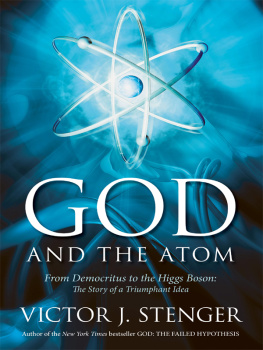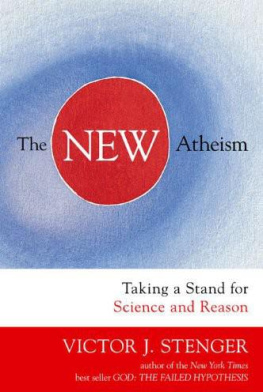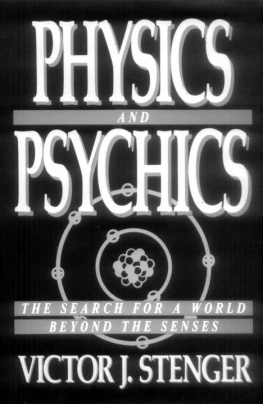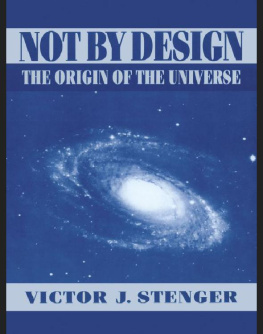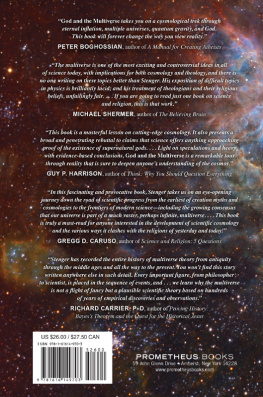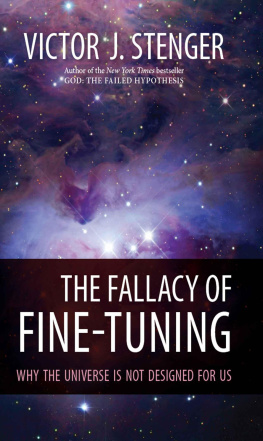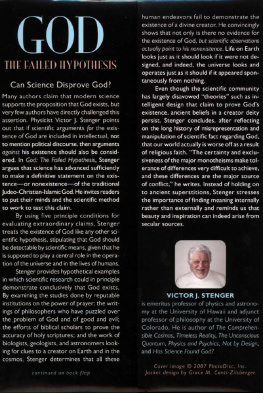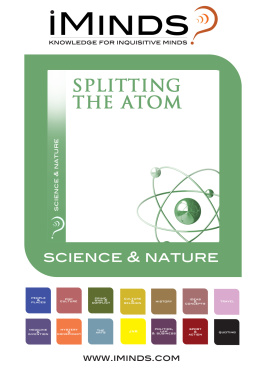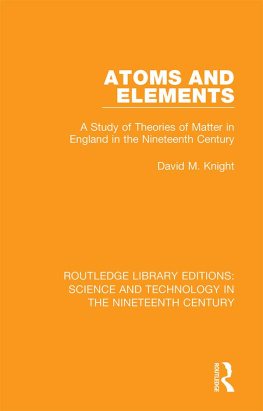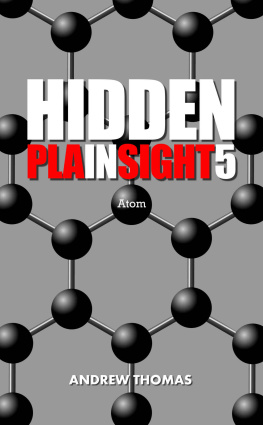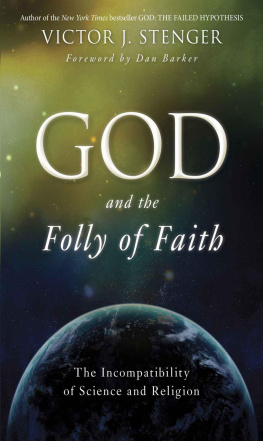
I am deeply grateful for the invaluable comments, suggestions, and corrections I received from historian Richard Carrier, philosopher Tom Clark, and the following members of the Internet discussion list avoid-L that tirelessly provides me with feedback on my writing: Martin Bier, Lawrence Crowell, Keith Douglas, Yonatan Fishman, John Mazetier, Don McGee, Brent Meeker, Kerry Regier, Anne O'Reilly, Christopher Savage, and Bob Zannelli. I would also like to thank the staff of the public library in Louisville, Colorado, for the efficiency with which they provide me with books from other libraries throughout the state.

Victor J. Stenger grew up in a Catholic working-class neighborhood in Bayonne, New Jersey. His father was a Lithuanian immigrant; his mother, the daughter of Hungarian immigrants. He attended public schools and received a bachelor of science degree in electrical engineering from Newark College of Engineering (now New Jersey Institute of Technology) in 1956. While at NCE, he was editor of the student newspaper and received several journalism awards.
Moving to Los Angeles on a Hughes Aircraft Company fellowship, Dr. Stenger received a master of science degree in physics from UCLA in 1959 and a doctorate in physics in 1963. He then took a position on the faculty of the University of Hawaii and retired to Colorado in 2000. He currently is adjunct professor of philosophy at the University of Colorado and emeritus professor of physics at the University of Hawaii. Dr. Stenger has also held visiting positions on the faculties of the University of Heidelberg in Germany and the University of Oxford in England, and he has been a visiting researcher at Rutherford Laboratory in England, the National Nuclear Physics Laboratory in Frascati, Italy, and the University of Florence in Italy.
His research career spanned the period of great progress in elementary particle physics that ultimately led to the current standard model. He participated in experiments that helped establish the properties of strange particles, quarks, gluons, and neutrinos. He also helped pioneer the emerging fields of very high-energy gamma ray and neutrino astronomy. In his last project before retiring, Dr. Stenger collaborated on the underground experiment in Japan that in 1998 showed for the first time that the neutrino has mass. The Japanese leader of this project, Masatoshi Koshiba, shared the 2002 Nobel Prize in Physics for this work.
Victor J. Stenger has had a parallel career as an author of critically well-received, popular-level books that interface between physics and cosmology and philosophy, religion, and pseudoscience. His 2007 book, God: The Failed Hypothesis, made the New York Times bestseller list in March of that year.
Dr. Stenger and his wife, Phylliss, have been happily married since 1962 and have two children and four grandchildren. They celebrated their golden wedding anniversary on October 6, 2012. They now live in Lafayette, Colorado, and travel the world as often as they can.
Dr. Stenger maintains a popular website where much of his writing can be found, at http://www.colorado.edu/philosophy/vstenger/. He also maintains an e-mail discussion list, avoid-L, where the topics range from his own writings to the whole gamut of intellectual discourse and politics.

Not by Design: The Origin of the Universe (1988)
Physics and Psychics: The Search for a World beyond the Senses (1990)
The Unconscious Quantum: Metaphysics in Modern Physics and Cosmology (1995)
Timeless Reality: Symmetry, Simplicity, and Multiple Universes (2000)
Has Science Found God? The Latest Results in the Search for Purpose in the Universe (2003)
The Comprehensible Cosmos: Where Do the Laws of Physics Come From? (2006)
God: The Failed HypothesisHow Science Shows That God Does Not Exist (2007)
Quantum Gods: Creation, Chaos, and the Search for Cosmic Consciousness (2009)
The New Atheism: Taking a Stand for Science and Reason (2009)
The Fallacy of Fine-Tuning: Why the Universe Is Not Designed for Us (2011)
God and the Folly of Faith: The Incompatibility of Science and Religion (2012)

Adler, Robert. Neutrinosthe Next Big Small Thing. New Scientist, September 8, 2012, pp. 3035.
Albert, David. On the Origin of Everything. New York Times, March 23, 2012.
al-Khalili, Jim. The House of Wisdom: How Arabic Science Saved Ancient Knowledge and Gave Us the Renaissance. New York: Penguin Press, 2011.
Anderson, P. W. More Is Different. Science 177, no. 4047 (1972): 39396.
ATLAS Collaboration. Observation of a New Particle in the Search for the Standard Model Higgs Boson with the ATLAS Detector at the LHC. Physics Letters B 716, no. 1 (2012): 129.
Augustine (Bishop of Hippo), Saint, and Marcus Dods. The City of God. New York: Modern Library, 1993.
Bachelard, Gaston. Les Intuitions Atomistiques [The Atomistic Intuitions]: Essai de Classification. 2nd ed. Paris: J. Vrin, 1975.
Barbour, Ian G. Religion and Science: Historical and Contemporary Issues. San Francisco, CA: HarperSanFrancisco, 1997.
Barnes, V. E., P. L. Conolly, D. J. Crennell, and B. B. Culwick. Observation of a Hyperon with Strangeness Minus Three. Physical Review Letters 12, no. 8 (1964): 204206.
Bartholomew, David J. God, Chance, and Purpose: Can God Have It Both Ways? Cambridge; New York: Cambridge University Press, 2008.
Bartusiak, Marcia. The Day We Found the Universe. New York: Pantheon Books, 2009.
Basil, Robert, ed. Not Necessarily the New Age: Critical Essays. Amherst, NY: Prometheus Books, 1988.
Berginger, J., et al. The Review of Particle Physics. Physical Review D86 (2012): 010001.
Bethe, Hans A. The Electromagnetic Shift of Energy Levels. Physical Review 72, no. 4 (1947): 33941.
Blom, Philipp. A Wicked Company: The Forgotten Radicalism of the European Enlightenment. New York: Basic Books, 2010.
Bohm, David, and B. J. Hiley. The Undivided Universe: An Ontological Interpretation of Quantum Theory. London; New York: Routledge, 1993.
Brewton-Parker College. History of the Development of the Periodic Table of Elements. April 15, 2010. http://www.bpc.edu/mathscience/chemistry/history_of_the_periodic_table.html.
Brown, Alison. The Return of Lucretius to Renaissance Florence. Cambridge, MA: Harvard University Press, 2010.
Brundell, Barry. Pierre Gassendi: From Aristotelianism to a New Natural Philosophy. Dordrecht, Neth.; Boston; Norwell, MA: D. Reidel, 1987.
Byers, Nina. E. Noether's Discovery of the Deep Connection between Symmetries and Conservation Laws. Paper presented at the Israel Mathematical Conference, Bar Ilan University, Tel Aviv, Israel, December 23, 1996.

